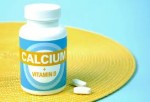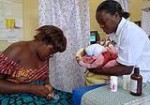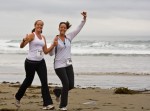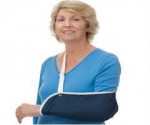 If a bone density scan has placed you at risk for osteoporosis, you might want to think twice before starting a bone-building medication as a first course of action. Changing your diet to include more calcium and vitamin D is an effective and less risky strategy that doctors often disregard, according to a recent University of Illinois study published in the journal Nutrients.
If a bone density scan has placed you at risk for osteoporosis, you might want to think twice before starting a bone-building medication as a first course of action. Changing your diet to include more calcium and vitamin D is an effective and less risky strategy that doctors often disregard, according to a recent University of Illinois study published in the journal Nutrients.
Many doctors are quick to prescribe bone-building medication because they believe it's unlikely that people will change their diets, said study co-author Karen Chapman-Novakofski, professor of nutrition at University of Illinois. But these medications have risks, which ironically include an increase in hip fractures and jaw necrosis, and therefore should be used as a last resort when diet and supplements don’t help, she said.
In the study, which analyzed 219 articles in scientific journals, the researchers found that adults who increase their intake of vitamin D and calcium, whether through food or supplements, usually increase their bone mineral density and reduce their risk for hip fracture significantly.
The National Osteoporosis Foundation recommends that adults age 50 and older get a total of 1,200 mg of calcium and 800-1,000 international units (IUs) of vitamin D every day. Karen Plawecki, lead author of the study, said it is possible to consume the recommended calcium without gaining weight. Three glasses of 1 percent or skim milk contain 900 mg of calcium, and many other foods, like soy milk, orange juice, cereal and bread, are often fortified with calcium and vitamin D.
The researchers also noted that following a low-sodium diet seems to have a positive effect on bone density. Click the National Osteoporosis Foundation links below for tips on getting enough calcium and vitamin D.

 Most of us get heartburn from time to time. It may come as a burning sensation in the chest, or a bitter taste in the back of the throat. Heartburn is one word people use to describe reflux. It happens when stomach contents come back upwards. Reflux is sometimes painless: You may have trouble swallowing or get a dry cough, perhaps some wheezing.
Most of us get heartburn from time to time. It may come as a burning sensation in the chest, or a bitter taste in the back of the throat. Heartburn is one word people use to describe reflux. It happens when stomach contents come back upwards. Reflux is sometimes painless: You may have trouble swallowing or get a dry cough, perhaps some wheezing. The more I learn about contaminants in the environment, the more I shop at the local organic market---but it can be expensive. At a recent lecture held at Northwestern on the Environment and Women's Reproductive Health, I learned that some fruits and vegetables are likely more contaminated than others. So the key to healthier eating on a budget is to go organic with the 'dirty' foods and still buy conventionally farmed produce that is least likely to be affected by contamination.
The more I learn about contaminants in the environment, the more I shop at the local organic market---but it can be expensive. At a recent lecture held at Northwestern on the Environment and Women's Reproductive Health, I learned that some fruits and vegetables are likely more contaminated than others. So the key to healthier eating on a budget is to go organic with the 'dirty' foods and still buy conventionally farmed produce that is least likely to be affected by contamination. An inexpensive instructional program to teach routine newborn care skills to midwives in Zambia resulted in a substantial reduction in the death rate of infants in the first week of life, according to a study funded by the National Institutes of Health and the Bill and Melinda Gates Foundation.
An inexpensive instructional program to teach routine newborn care skills to midwives in Zambia resulted in a substantial reduction in the death rate of infants in the first week of life, according to a study funded by the National Institutes of Health and the Bill and Melinda Gates Foundation. Fat talk (women speaking negatively about the size and shape of their bodies) is a popular phenomenon among college women according to a study done by researchers at U of Wisconsin and Northwestern University. Rachel Salk and Renee Engeln-Maddox interviewed 168 female students at a midwestern U.S. university. Their work was published in the
Fat talk (women speaking negatively about the size and shape of their bodies) is a popular phenomenon among college women according to a study done by researchers at U of Wisconsin and Northwestern University. Rachel Salk and Renee Engeln-Maddox interviewed 168 female students at a midwestern U.S. university. Their work was published in the  Choosing a treatment option for breast cancer can be almost as confusing and frightening as the diagnosis itself. But it doesn’t have to be. A new study from the University of Michigan has found that women make smarter choices about treatments when they receive information and make decisions in small doses rather than all at once.
Choosing a treatment option for breast cancer can be almost as confusing and frightening as the diagnosis itself. But it doesn’t have to be. A new study from the University of Michigan has found that women make smarter choices about treatments when they receive information and make decisions in small doses rather than all at once. It has been reported in the past that obesity (body fat mass) is protective against osteoporosis and fracture. However, a recent study has documented a high prevalence of obesity in postmenopausal women with fragility fracture.
It has been reported in the past that obesity (body fat mass) is protective against osteoporosis and fracture. However, a recent study has documented a high prevalence of obesity in postmenopausal women with fragility fracture. Now that so many women are balancing school, family, and work, it's hard to find time to stand up for women's causes. But it is important and it does work. Recently a prominent surgeon wrote a Valentine's Day editorial about the mood enhancing effects of semen on women during unprotected sex. He cited a research study done in 2002 that reported that female college students who had had unprotected sex were less depressed that those who used condoms. It implied that compounds in semen have antidepressant effects. He goes further to imply sex without condoms may be a nice Valentine's present. WHAT?#?#
Now that so many women are balancing school, family, and work, it's hard to find time to stand up for women's causes. But it is important and it does work. Recently a prominent surgeon wrote a Valentine's Day editorial about the mood enhancing effects of semen on women during unprotected sex. He cited a research study done in 2002 that reported that female college students who had had unprotected sex were less depressed that those who used condoms. It implied that compounds in semen have antidepressant effects. He goes further to imply sex without condoms may be a nice Valentine's present. WHAT?#?# Today, over 250 health professionals attended our monthly forum on the environment and reproductive health and I am certain that no one left the room doubting that the chemicals we are exposed to at home, at work, in our food, and in the air are harmful to reproductive health. Dr. Tracey Woodruff from the Program on Reproductive Health and the Environment from UC SF was our outstanding speaker. A summary of her presentation will be posted in a few days on this blog but if you are concerned about the effect of chemicals on you and your family, especially children, she directed us to a brochure her institution produced that is available free on line that is filled with helpful hints. Click on
Today, over 250 health professionals attended our monthly forum on the environment and reproductive health and I am certain that no one left the room doubting that the chemicals we are exposed to at home, at work, in our food, and in the air are harmful to reproductive health. Dr. Tracey Woodruff from the Program on Reproductive Health and the Environment from UC SF was our outstanding speaker. A summary of her presentation will be posted in a few days on this blog but if you are concerned about the effect of chemicals on you and your family, especially children, she directed us to a brochure her institution produced that is available free on line that is filled with helpful hints. Click on  Male fetuses most vulnerable to alcohol.
Male fetuses most vulnerable to alcohol.